The North Carolina Medical Board just proposed a revision to its current policy on self-treatment and prescribing to family members. It does not look dramatically different from prior policy statements. The updated policy draft was posted for comments (below). Not surprisingly, our colleagues have strong opinions.
2.2.3: Self-Treatment and Treatment of Family Members
Treating oneself or a family member presents unique and significant challenges, including risks to professional objectivity, concerns about patient autonomy, and difficulties ensuring informed consent. These factors can lead to ethical and practical dilemmas that compromise the quality of care.
The North Carolina Medical Board enforces rules 21 NCAC 32B.1001, 32S.0212, and 32M.0109, which strictly prohibit licensees from prescribing controlled substances, including all narcotics, to themselves and their immediate family members under any circumstance.
Furthermore, it is the position of the Board that licensees should not prescribe non-controlled medications or manage chronic conditions for themselves, their immediate family members, or those with significant emotional ties. In these situations, professional objectivity is at risk, and personal feelings may unduly influence clinical judgment, thereby interfering with the delivery of optimal care. In addition, family members may hesitate to express a preference for another physician or decline a recommendation due to a fear of causing offense.
There are, however, limited and specific situations where treatment of oneself or a family member may be acceptable:
- Emergency Conditions. In an emergency situation, when no other qualified licensee is available, it is acceptable for licensees to treat themselves or their family members until another licensee becomes available.
- Urgent Situations. There may be instances when licensees or family members do not have their prescribed medications or easy licensee access. It may be appropriate for licensees to provide short term prescriptions.
- Acute Minor Illnesses Within Clinical Competence. While licensees should not serve as primary or regular care providers for themselves or their family members, there are certain situations in which care may be acceptable. Examples would be treatment of antibiotic-induced fungal infections or prescribing ear drops for a family member with external otitis. It is the expectation of the Board that licensees will not treat recurrent acute problems.
- Over-the-Counter Medication. This Position Statement is not intended to prevent licensees from suggesting over-the-counter medications or other non-prescriptive modalities for themselves or family members, as a lay person might.
Licensees who act in accord with this Position Statement will be held to the same standard of care applicable to licensees providing treatment for patients who are unrelated to them. Thus, licensees should not treat problems beyond their expertise or training.
The Board expects licensees to maintain an appropriate medical record documenting any care that is given. It is also prudent for the licensee to provide a copy of the medical record to the patient’s provider.
Licensees who inappropriately treat themselves, their family members, or others with whom they have a significant emotional relationship should be aware that they may be subject to disciplinary action by the Board.
One commenter wrote:
“This is my position that physicians should have right to treat themselves and their family members if they feel professionally and ethically comfortable to do so. Each physician should make the most responsible and ethical decision for themselves. Rx of controlled substances to self, family members and friends should be allowed in emergency situations only. There is no reason for a physician who is well qualified to treat his HTN to pay another physician for this service. There is no car mechanic who would pay another car mechanic for doing work on his car which he can get done himself.”
It’s hard to disagree.
Many of the commenters agreed that controlled substances should never be prescribed to family members. Even there, an argument could be made for some flexibility in select cases. Here’s why. While I understand why it would not be a great idea to prescribe 90 Dilaudid to one’s spouse, how about specific Schedule V compounds, such as those used to treat epilepsy? Imagine your family member has medication resistant epilepsy, but seizures are less severe and less frequent with lacosamide. Lacosamide is a schedule V compound. Have you ever heard of a Lacosamide abuser?
I found one note, in the Federal Register.
“Clinical studies also indicate that lacosamide has abuse potential. In a clinical study with recreational abusers of sedative hypnotic drugs, lacosamide, similar to alprazolam, produced subjective responses of “sedation,” “high,” “euphoria,” “drug liking,” and “good drug effects” similar to alprazolam. These effects of lacosamide were shorter in duration as compared to those of alprazolam. In clinical pharmacokinetic and electrocardiographic studies, healthy subjects reported a high rate of euphoria-type responses following lacosamide administration, suggesting its ability to produce psychological dependence. The data from animal and human studies indicate that chronic administration of lacosamide does not produce physical dependence, as there were no withdrawal symptoms upon its discontinuation.”
Still, providing a “rescue” prescription with the amount limited to just the weekend would be less onerous and burdensome than trying to get the same job done in an urgent care clinic or ED.
Every state treats this issue differently. Apparently, Tennessee allows one to prescribe a controlled substance to a family member in an emergency. One cannot prescribe that same substance to oneself.
A list of self-prescribing laws by state can be found here: https://worldpopulationreview.com/state-rankings/self-prescribing-laws-by-state
Not sure how accurate that list is.
What do you think?







A physician should be able to treat his family or himself if he is qualified. A mentor of mine performed a thyroidectomy on his wife because as he said “ I only want the best for my family as for my patients. I know of no person more qualified than myself to perform this surgery.”
Has my children needed sinus surgery I would have done it because I was more qualified than my colleagues. For years I ran a well known nationally recognized endoscopic sinus surgery course at a great medical school.
Also one should be able to prescribe non narcotic medications for their family or themselves.
Agree. Every other profession treats their family members.
There are two more arguments to made as well
Non controlled substances:
1. How is family defined- step children? ages? cousins? fiance? cousin? step siblings-
The NC law on non-controlled is overbroad and vague and probably won’t hold up in court with the over turn of Chevron.
Controlled Substances
2. The scheduling of drugs is loosely based on safety and abuse guidelines but the actual category is linked to criminal distribution statutes which SHOULD have no place as applied to physician practice. Unfortunately it is the DEA that categorizes them based on the FDA descriptions and here is where it goes wrong because the DEA are not trained in medicine and scheduling is not based on the practice of medicine. Another example of outright stupidity is that Lomotil is a category III- to Jeff’s point.
Many years ago when my Mother visited us and stayed at our home, as was her custom, she asked me to repair her bunion deformity that received constant shoe irritation. I explained to her that she would have to stay longer, and that this surgery might incur significant post operative discomfort.
She had adequate circulation and the procedure I chose was not at the “extreme” range of complexity. She tolerated the procedure well. Rather than have her take powerful narcotics, I did one time administer a posterior tibial nerve block by injection.
She did stay an extra month. There were no complications and she returned to her shoe gear normally. We “took care of her” during the healing process.
I probably should have asked my wife before doing this since most of the onus of care fell on her! I probably shouldn’t have done this, but there were no complications.
There were other instances when I treated my family (outside) of my limited medical license. Those too worked out very well, even though I should not have done them. My wife says the “worst”thing about my retirement is my loss of prescriptive ability
Michael M. Rosenblatt, DPM
I have a very close friend who is quite a genuine and caring foot surgeon. He is very well trained and did an excellent residency. Throughout his career, he did Rx certain common meds that he routinely used, but, he Rx’ed them to friends for diseases outside of his license. His favors for friends were quite limited. He also Rx’d low level opioids, primarily Tylenol #3 for acute pain. As I recall, he wrote a total of 5 Rx for T#3’s. He had a falling out with a partner who reported him to the State Board and that is when his trouble began.
His discipline was a revocation of his license, data banked in the OIG Exclusion List, and 3 years of probation. It is my opinion that this was overkill as he had no prior exposure to the State Board nor has he ever been in trouble before.
In my opinion, regarding treating “family members” with opioids, the red flag would be to Rx to anyone with the same last name as the physician, unless one’s name is Jones or Smith.
It is unlikely that an investigation would be started to see of a patient is step kid, cousin, etc.
Regarding if the NC Board is overreaching, yes, a it would need a Court to decide. And, the Chevon decision would be important, in my opinion. However, who wants to go to Court and to subject oneself to the stress and financial cost of it?
My advice is pragmatic and simple. Dont do “favors” for others. And, if one does, create a chart for that individual. That simple act would prevent a lot of grief. Absolutely do not Rx opioids for family members regardless if the state board would allow it. The DEA does not.
Richard B. Willner
The Center for Peer Review Justice
http://www.PeerReviewJustice.ORG
I am aware of a physician now deceased, who prescribed a one time opioid for his daughter in law. NOT A blood relative. But she had his same last name. Therefore he was not treating a relative, but a “family member”. This was a short time, one time prescription. He had one or two questionable judgement prescriptions not for family members. The board took his license. End of a 50 year medical career.
This board and other medical boards are overzealous in the extreme. There is no evaluation involved. However if the same physician had a substance abuse disorder in our state, he would be given a free pass. Offense 1, 2, 3, 4 all okay.
There is something completely schizophrenic about this.
What about the prescription of non controlled substances?
What about distributing free samples to your family that are never going to be used for patients in the practice.
What about free samples to treat yourself?
The circumstances are so broad, that limited government intervention should be the rule, unless some harm comes to a patient. Otherwise the medical boards have proven they do not have the wisdom to intervene.